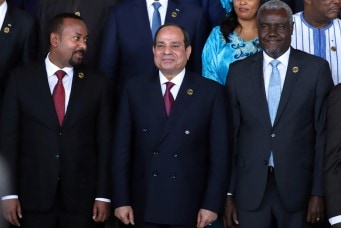Perceptions from Abroad
How to fight foreign perceptions that the Arab World is violent and in complete turmoil
The last decade has been, by any and all standards, chaotic and challenging for the Middle East, especially for the Arab World. This has raised serious concerns about how the world perceives the region. The September 11, 2001 terrorist attacks in United States, and a decade later, the Arab awakenings of 2010 and 2011, fueled foreign perceptions that the Arab World was violent and in complete turmoil. The tug of war between fundamentalists and modernists, liberals and conservatives, democracy promoters and authoritarians has had dire consequences for the region’s image abroad and the world’s perception of our people.
Many of my Arab diplomatic colleagues in Washington, where I served as ambassador from 1998 to 2008, and my Egyptian peers and national constituency back home strongly asserted that post-2011 perceptions of Arabs and the region were unfair, false, and tainted with bias. The argument put forth at the time was that Arabs should completely disregard and refrain from reacting to them. For me, however, apathy or complacency were not the correct response, even when claims made against us were wrong or unjustified. Left unchallenged, repeated false perceptions can create a damaging semblance of truth, especially for the layperson. After September 11, I remember conveying our sincerest condolences to the American administration and strongly condemning the terrorist acts, but at the same time as “Egypt’s” ambassador in Washington cautioned against labeling the U.S. response as a war against Islam.
As a diplomat, I have dedicated over three decades of my life to Egypt’s foreign service. The most crucial task lying before me throughout my career has been to defend and promote Egypt’s interests abroad, and that’s why a significant component of my work dealt with managing foreign perceptions of Egypt and the Middle East. When perceptions were ill-conceived or critical, my efforts would focus on correcting or countering them. In most cases, these perceptions were imprecise, either because they were overly optimistic or unjustifiably critical. An equally important challenge was explaining these foreign perceptions—however “true” or “false” they may be—to both my own superiors and constituents.
Monitoring perceptions abroad was essential because of their possible influence on foreign and national decision-makers. I always recommended managing our reactions to negative views even in futile situations. This can be a delicate process because what is convincing to a Western society, for example, may not be so for people in other parts of the world and may even have negative ramifications for them. In a connected world, one must never ignore how explanations given to a foreign audience would appear to those back home, or the unexpected ways in which they could resonate.
Because the Middle East and the Arab World are part of the international community, perceptions do matter. Nevertheless, national interests, which most likely determine the policies we pursue, in general tend to be multidimensional and long-term, and thus should not and cannot be overly defined by foreign or domestic public perceptions, or opinion polls that often focus on short-term issues.
Herein lies the crux of the problem and the response to it: the Arab Middle East is too dependent on foreign stakeholders and thus is oftentimes regrettably ineffective in dealing with its regional affairs, especially in comparison to the non-Arab members of the region like Turkey and Israel for example. Consequently, the region’s national interests are disproportionately hurt by foreign perceptions. Arab reactions tend to either over-emphasize the importance of foreign perceptions by reacting defensively to criticism from abroad or hype up and boast flattering foreign perceptions (even though the reason behind them is, more often than not, us catering to foreign interests rather than our own). Arab newspapers frequently designate front-page stories to recount flattering or refute negative foreign press articles.
Proactive domestic and regional policy-making, within the context of a well-planned strategic vision by each Arab country, will enhance its interests and those of the Arab region as a whole. This should be our new focus. We, as Arabs, must attempt to determine our own future if our complaints about foreign interference or influence are to be heard. We must have well-thought-out strategic objectives in order to properly ascertain the degree and nature of over response to outside perceptions of the Middle East. Otherwise, we will continue to be described by commentators such as Thomas Friedman in one of his rather acerbic op-eds as “Crazy Poor Middle Easterners,” which sadly I must admit is testimony to foreign perceptions of the Middle East taking hold.
Nabil Fahmy, a former foreign minister of Egypt, is the dean of the School of Global Affairs and Public Policy at the American University in Cairo. He served as Egypt’s ambassador to the United States from 1999–2008, and as envoy to Japan between 1997 and 1999. On Twitter: @mnabilfahmy.


